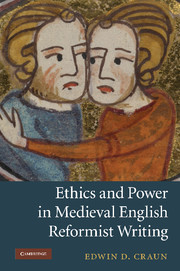Book contents
- Frontmatter
- Contents
- Acknowledgments
- Editorial practices, translations, abbreviations
- Introduction
- 1 Universalizing correction as a moral practice
- 2 Negotiating contrary things
- 3 Managing the rhetoric of reproof: the B-version of Piers Plowman
- 4 John Wyclif: disciplining the English clergy and the Pope
- 5 Wycliffites under oppression: fraternal correction as polemical weapon
- 6 Lancastrian reformist lives: toeing the line while stepping over it
- Postscript
- Notes
- Bibliography
- Index
- CAMBRIDGE STUDIES IN MEDIEVAL LETERATURE
Introduction
Published online by Cambridge University Press: 15 April 2010
- Frontmatter
- Contents
- Acknowledgments
- Editorial practices, translations, abbreviations
- Introduction
- 1 Universalizing correction as a moral practice
- 2 Negotiating contrary things
- 3 Managing the rhetoric of reproof: the B-version of Piers Plowman
- 4 John Wyclif: disciplining the English clergy and the Pope
- 5 Wycliffites under oppression: fraternal correction as polemical weapon
- 6 Lancastrian reformist lives: toeing the line while stepping over it
- Postscript
- Notes
- Bibliography
- Index
- CAMBRIDGE STUDIES IN MEDIEVAL LETERATURE
Summary
I see my friends take discounts for which they're not really eligible, buy and wear clothes they later return, stiff waiters, and in many ways cheat the system. I find this deplorable. Then again, when I was young, I used to do many of the same things. How can I justify my righteous attitude when I've been just as guilty? And what do I say when my friends brag about these dubious achievements?
Randy Cohen's answer to this query, submitted to the New York Times Sunday column “The Ethicist” a decade ago, could have come from a late medieval sermon or pastoral text on fraternal correction of sin, save for its references to “Oprah” and Dr. Johnson. You have reformed years ago, Cohen advises Allegreta Behar-Blau of Woodland Hills, California, so you are not being inconsistent. Anyhow, you “needn't be completely virtuous to encourage virtue in others.” You can tell your friends what you think “if you speak directly, quietly, and without chastising them.”
Fraternal correction of sin, the late medieval practice of admonishing others charitably for their evil conduct in order to reform them, is almost as invisible to medievalists as to most other readers of the Sunday New York Times. Even though the movement to expand pastoral care from the early thirteenth century on enjoined all Christians – lay and clerical – to reprove sin as an act of charity whenever they encountered it in a fellow Christian, especially clerics in positions of disciplinary power (confessors, bishops, the Pope), no scholar has examined how fraternal correction was constructed in pastoral writing, let alone how it was seized upon and adapted resourcefully by writers intent on widespread reform.
- Type
- Chapter
- Information
- Publisher: Cambridge University PressPrint publication year: 2010

